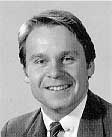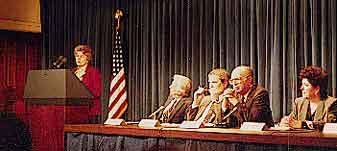Expressing
the sense of Congress regarding the inability of American
citizens to maintain regular contact with relatives in the Soviet Union
Whereas millions of
United States citizens, including members of national and ethnic groups
such as Armenians, Byelorussians, Estonians, Georgians, Germans, Jews,
Latvians, Lithuanians, Poles, Russians, and Ukrainians, have relatives
in the Soviet Union;
Whereas the Soviet Union,
as a signatory of the 1975 Final Act of the Conference of Security
and Cooperation in Europe, commonly known as the Helsinki Accords,
committed itself to "favourably consider applications for travel
with the purpose of allowing persons to enter or leave their territory
temporarily, and on a regular basis if desired, in order to visit members
of their families.";
Whereas in that same
document the Soviet Union pledged that "applications for temporary
visits to meet members of . . . families will be dealt with without distinction
as to country of origin or destination . . . ; cases of urgent necessity
such as serious illness or death will be given priority treatment.";
Whereas the Soviet Union
has ratified the United Nations Charter and signed other international
human rights documents such as the International Covenant on Civil and
Political Rights, documents which clearly protect the right to leave one's
country and return thereto;
Whereas in anticipation
of the Geneva Summit Conference of November 1985, President Reagan stated,
". . . the cause of peace would be served if more individuals and
families. . . could come to know each other in a personal way.";
Whereas home visits
would immeasurably aid our understanding of the Soviet people and improve
relations with the Soviet Union, since family visitation is one of the
most basic forms of cultural exchange;
Whereas it is not proper
for governments to decide which relationships constitute close family
ties for the purpose of determining which relatives should be allowed
to visit each other;
Whereas the present
policies of the Soviet Union make it virtually impossible for the millions
of relatives in the two countries to exchange visits in their homes, and
relatives who have used other forms of communication, such as mail, telephone,
telegraph, and gift parcels have experienced enormous difficulties;
Whereas because of restrictive
Soviet policies, less than 1,000 of the many thousands of Americans who
visited the Soviet Union in 1986 were allowed a private visa to stay with
their relatives in their homes, and only about 1,500 Soviet citizens were
allowed to visit their relatives in the United States;
Whereas many Americans
who have been frustrated by the delay or denial in obtaining private visas
to visit family members in their homes in the Soviet Union have resorted
to joining package tours to the Soviet Union as a means of seeing their
family members;
Whereas relatives should
be able to comfort and assist each other in the event of medical emergencies
such as those which resulted from the Chornobyl disaster, or when specialized
medical treatment is not available in a particular country;
Whereas in the case
of serious illness or death the victim's relatives should be guaranteed
expeditious determination of their visa applications;
Whereas family visitation
is an issue which transcends political differences, and governments which
permit normal and regular family visitation demonstrate a commitment to
basic values of decency and fairness which are shared by all mankind;
and
Whereas at the Vienna
Conference on Security and Cooperation in Europe Follow-up Meeting, the
United States delegation enumerated the inappropriate restrictions placed
by Soviet authorities on Soviet citizens who wish to travel abroad and
on United States citizens who wish to visit family members in the Soviet
Union: Now, therefore, be it Resolved by the House of
Representatives and the Senate,
That it is the sense of
the Congress that
(1) the promotion of unrestricted
family visits between related people in the United States and the Soviet
Union is an essential part of American policy toward the Soviet Union;
and
(2) the President, the Secretary
of State, and other members of the administration should raise the issue
of family visitation at all appropriate opportunities in discussion with
the leadership of the Communist Party and the Government of the Soviet
Union.
Chronology
of VISA
1985 VISA
established. Dan Horodysky was interviewed on Voice of America (VOA) beamed
to the Soviet Union.
1986 Started VISA
VIEWS newsletter highlighting representative cases
1987 Authored U.S. Congressional
Resolutions (HCR 68 and SCR 29) in 100th Congress "Regarding the Inability
of American Citizens to Maintain Regular Contact with Relatives in the USSR";
passed unanimously
Spoke at White House and State Department conferences on Human Rights Day
- December 10
President Reagan addresses Human Rights Organizations' Representatives
Tamara (Toni) Horodysky speaks on the Family Visits issue - (presidential
aides at the table)
President Reagan spoke out
at the 1988 Moscow Summit. President Reagan stated:
"Recently, a few individuals and families have been allowed to visit
relatives in the West. We can only hope that it won't be long before all
are allowed to do so, and Ukrainian-Americans, Baltic-Americans, Armenian-Americans,
can freely visit their homelands, just as this Irish-American visits his."
1988 Toni Horodysky appeared
on NBC Today Show television program to discuss the issue.
Attended White House and State
Department conferences on Human Rights.
Attended Moscow human rights
conference; delivered computer, fax machines, books, letters and videos
to human rights' activists.
1989 Sent Freedom
of Travel Appeal, in English and Russian, signed by 189 American
and Soviet citizens, including four Nobel Prize laureates, to Presidents
George Bush and Mikhail Gorbachev*
Neither acknowledged receipt despite personal letters of introduction from
then-Senator Pete Wilson of California and a political science professor
who was a speech writer for the first President Bush when he was vice-president.
Attended human rights conferences
in Moscow and Paris, met and presented Freedom of Travel Appeal to
future Russian president, Boris Yeltsin, at Moscow rally; delivered computer,
fax machines, printers, letters, written and video materials to activists.
1990 Delivered 12 computers
and printers to USSR; eight volunteers taught courses to human rights activists;
placed computers and printers with organizations in three cities.
1991 Volunteers continued
computer instruction in three cities; sponsored Canadian ecological organization
assisting children affected by Chernobyl nuclear disaster. Sponsored independent
journalist project by former Baltimore Sun Moscow correspondent.
Donated Macintosh computers and
printers to independent publishing group.
Assisted Ukrainian documentary
film group during San Francisco Bay Area filming.
1992 Sponsored Junior
Achievement project and English language instruction.
1993 Sponsored State of
Arizona specialist computerizing emergency medical response system.
1989 to present
Sent United Nations literature
in English and Russian, hundreds of copies of U.S. Constitution and Bill
of Rights in Russian and Ukrainian, and other literature to activists.
Assisted Sabre Foundation in
Massachusetts in acquiring books for container shipments to former USSR,
Eastern Europe, and many other parts of the world.
Printed and distributed 10,000
copies each of the United Nations Declaration of Human Rights in Estonian,
Latvian, Lithuanian, and Ukrainian; sent 10,000 copies of same in Russian
and Belarussian provided by the United Nations.
Hosted and arranged press conferences
for human rights and environmental activists and reformers.
Working on Freedom of Contact for the millions who have relatives
and friends living in China, Taiwan, Tibet, North Korea, Cuba, Vietnam,
and other countries where this basic right is curtailed.
SUPPORT for
VISA
Funding & Assistance
National Endowment for Democracy
Americans for Human Rights in Ukraine
Baltic Alliance
Baltic American Freedom League
Congress of Russian Americans
Lithuanian American Committee
National Council on Soviet Jewry
Ukrainian Fraternal Association
Ukrainian National Association
Union of Councils of Soviet Jewry
The Washington Group
World Without War Council
Finnair
- to human rights' conferences in Moscow and Paris
TWA - to Washington, DC


 VISA
worked with Congressman Chris Smith (NJ) [photo at left] and Senator
Dennis DeConcini (AZ) to draft and introduce the following Congressional
Resolution. Special thanks to Congressman Chris Smith and and especially
to Dorothy Douglas Taft, aide to Congressman Smith, and presently
on the staff of the U.S. Commission on Security and Cooperation in Europe.
VISA
worked with Congressman Chris Smith (NJ) [photo at left] and Senator
Dennis DeConcini (AZ) to draft and introduce the following Congressional
Resolution. Special thanks to Congressman Chris Smith and and especially
to Dorothy Douglas Taft, aide to Congressman Smith, and presently
on the staff of the U.S. Commission on Security and Cooperation in Europe.

